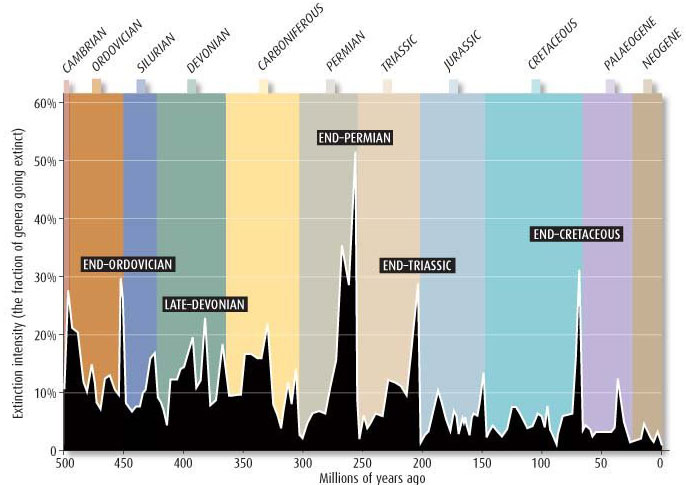This actually nicely proves my point, having cannon beneath every hill in the world isn't exactly practical solution. As a said the problem is in the idea can you really cover the entire problem on the global scale (and in time). The logistics is what is the real problem here. Not the design of means.
Therefore this is the map of extinctions during the times of when life on Earth was complex and multi-cellar. What is basically what interest us, all the bacteria before this doesn't not concern us in this topic. So as you can see the biggest disaster on the map was some 250 millions ago. The reasons for this happening are multiple. However the main reason for this was strong volcanic activity that happened due to complex reasons in what is modern day Siberia. What pumped out plenty of CO2 and made oceans more acid like. Since CO2 in contact with water turns into acid and that is causing food chain collapse in the seas if things go too far. The map is expressed in genera, which is a type of animal. For example all species of goats are one genera, all types of horses are another one, all sharks are another ... etc. What means that in that moment of Earth's history about a half of animal types disappeared. While the ones that made it have lost many species and species that made it were decimated. Plus it is worth saying that large animals had biggest loses, sicne they need more food. As a rule mass extinction tends to cripple the food supply and therefore in mass extinctions the first thing that goes away are the species on top of the food chain. Since all of this completely disruptes the food chains on which such animals stand.
In other words what we are doing is pretty close to what happened then. We are using fossil fuel energy that was under ground for hundreds of millions of years and then we are releasing all of it in the geological blink of 100 or 200 years. While even in the super mass extinction from 250 million years ago the process of pumping out all that CO2 through volcanic activity probably lasted for something like 2 million years. What gave the plants and animals some time to adapt or migrate/spread into some areas that are better for them. While we are doing all of this in the scale of a century or two (and in combination with heavy pollution and killing all animal life that gets in the way). Therefore saying that we are playing with fire is an understatement.
Why exactly all of this should be the worse than K-T extinction ? Because if you look at the world as it was just some 500 years ago it was full of buffalos, bears, dears, rabitts, horses, big cats, wales ... while today all of these populations are decimated. Whales almost extinct in late 20th century but then a few international treaties managed to prevent their outright extinction. In other words we are already living on the planet that was basically hit by an asteroid when it comes to animal populations. While as I have shown before our real problems with climate disruption haven't even started yet. Therfore this will almost surely be worse than the extinction of dinsaurs when you consider how much of life will die out. The rate at which human race cosumes everything is completely unpresidented. What means that the nature's food chains will get heavily disrupted globally and everything will just come crashing down (including our own food supply).
Out of 8+ billion people on the planet something like 5 is fairly heavily dependent on the sea for food. Therefore if you release extra CO2 into the system the oceans in contact with it are becoming more acid like. What harms microoranisms in the sea since this disrupts their bilological processes. What means that oragnisms that eat those starve. While those that eat those organisms starve. And those that eat those are fish, so they starve as well. What means that humans that eat those fish will also starve. While those people that relly more on the agriculture will see their crops decimated by freaky weather and disapearance of glacers. Which are feeding the rives over warm and dry parts of the year. What is a problem that si already starting to bite all across the word. This is why I said that the main problem of climate change is securing food supply for expanding global population. Everything else is basically just a side-story in all of this.
What altogather is basically why there is such a mess in the media over the topic. Since pretty much everything suggests that there is a fair amount or people that couldn't take this topic in it's raw form. People went bonkers over COVID and COVID is kinergarden party next to this topic once you go really deep into it.


